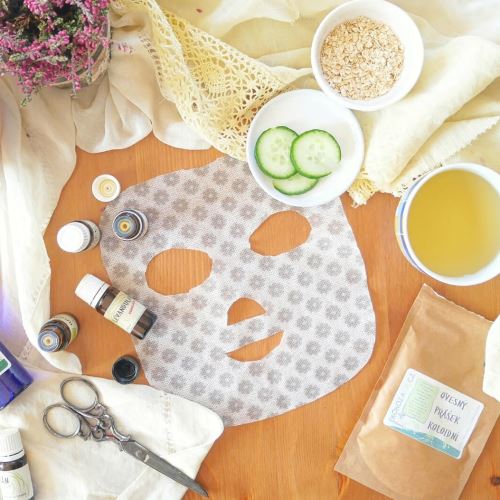You've probably come across fabric face masks before, drugstores and other cosmetics stores are full of them. Most of the time, however, their price is not exactly negligible - and when we don't want to pay too much for something, the classic question comes up: Can't I make it myself and cheaper at home?
Even Ekokoza asked herself this question and decided to try it! And it was definitely worth it, so don't hesitate to try it too.
How does it work? Good!
While many classic facial masks work at the same time as an exfoliant or on the principle of peeling, fabric facial masks rather hydrate and strengthen the skin.
The fabric is not in this mask because the mask is fun, it has a practical purpose. When you apply a moistened cloth mask to your face, the moisture will slowly evaporate. This happens even after applying an ordinary face mask... BUT! It is the substance that slows down evaporation a little, so the active substances contained in the mask are absorbed deeper into our skin, and we thus benefit much more from them.

Material
You are probably asking yourself the question of what material to make such a fabric mask from... So don't worry, as always you will find everything you need at Ekokoze, and actually maybe even in the drawer. You can cut the mask exactly to size from the cheese cloth. An old cotton handkerchief, an old t-shirt, or gauze will work just as well. From this we simply cut out a round or oval shape approximately according to the dimensions of your face, and of course we must not forget the openings for the mouth and eyes and the cross-section for the nose.
You just need to soak the cloth mask prepared in this way in an elixir mixed exactly according to your skin's liking and needs, let it work, then just wash it off, let it dry and use it repeatedly as long as you want.
So enjoy it and it's done!

Eco goat elixir for all skin types - ideal for a homemade textile mask
And what do we like to buy a fabric face mask in?
What does it take?
- 1/4 cup of chamomile tea
- 1/4 cup of milk
- 2 tablespoons of colloidal oat powder
- 2 tablespoons of honey powder
- 3 drops of selected essential oil, ideally for example chamomile, tea tree oil, hemp oil or lavender, which are also good for sensitive skin
What to add?
Or rather what else to add?
The ingredients listed above are, one might say, suitable even for sensitive skin, so to speak, it is such a basic recipe that should "fit" everyone. However, it can get boring after a few uses... and we don't want that! But there are so many other amazing ingredients that we can add to the mask.
First, a small addition to the milk - of course you can also use cow's milk, but how about trying other variants? For example, donkey milk has sixty times more vitamin C than cow's milk, mare's milk is gentle, soothing and has great regenerative power, and goat's milk contains a lot of vitamins and helps maintain the natural pH of our skin. Don't be afraid to try vegetable milk either - coconut milk is very popular and goes well with a face mask. We then mix the powdered milk in 1 cup of water to maintain the proportions.
If we want to add interest to the mask, we can also add some dried herbs or flowers - for example lavender (or lavender powder), calendula, rose or maybe jasmine.
You can't go wrong with, for example, hemp protein, Ayurvedic manjishta powder, which is suitable for problematic skin, as well as moringa or nimba. For regeneration and on irritated or sensitive skin, you can use damask rose powder, and you can add strawberry or other fruit powder to the mask to add fragrance. For more inspiration, look here.
Nothing should be overdone, you know that, so you don't have to put everything in your mask either. You can always make a mask according to your mood and taste and gradually try what suits your skin best.
How to do it?
Make a decoction of chamomile flowers, strain and let cool. Then, in a deep soup plate, mix it with milk, powders, essential oils, or other ingredients that you choose to add to your mixture. Finally, soak the mask in the mixture and let it "infuse" for a while, at least five minutes. Then we take out the mask, wring it out and apply it to the face so that it is beautifully smoothed and without major folds. We leave it on for half an hour, take it off, rinse our face, or apply it straight away, if necessary. Ideally, some natural oil, almond or argan remains a good old classic.
Then we can just relax and enjoy the feeling of a satisfied face!

Let's disguise ourselves!
Putting on a face mask is sometimes simply a must if we want to take good care of our skin. Just as we need a bath from time to time, our skin needs a mask from time to time. And you have a lot of options at our Ekokoza. How about trying this cleansing clay mask, for example, this cleansing pink bar also contains clay. Clays in general are then a great material for facial masks, so check out this super article about bentonite, zeolite and rhassoul.
And what did you add to your cloth face mask?
Don't forget to follow us on our social networks, Facebook and Instagram, so you don't miss our other tutorials and tips. And explore our new eco-friendly recipe!





